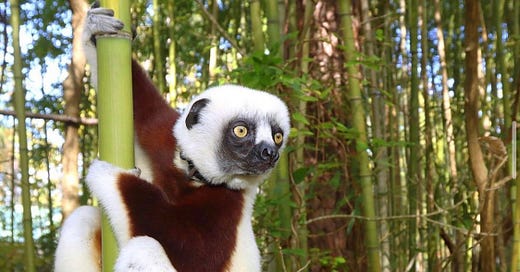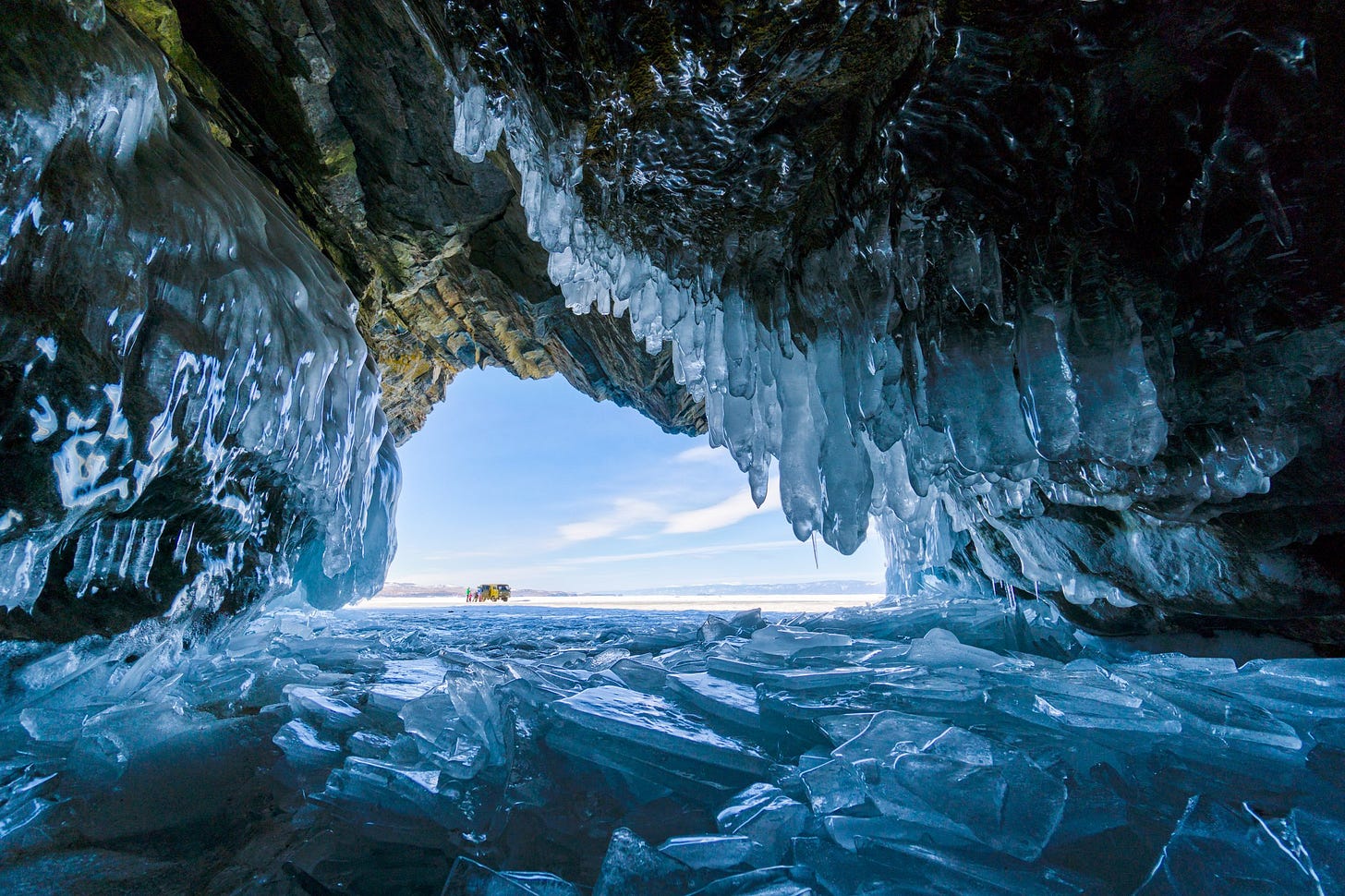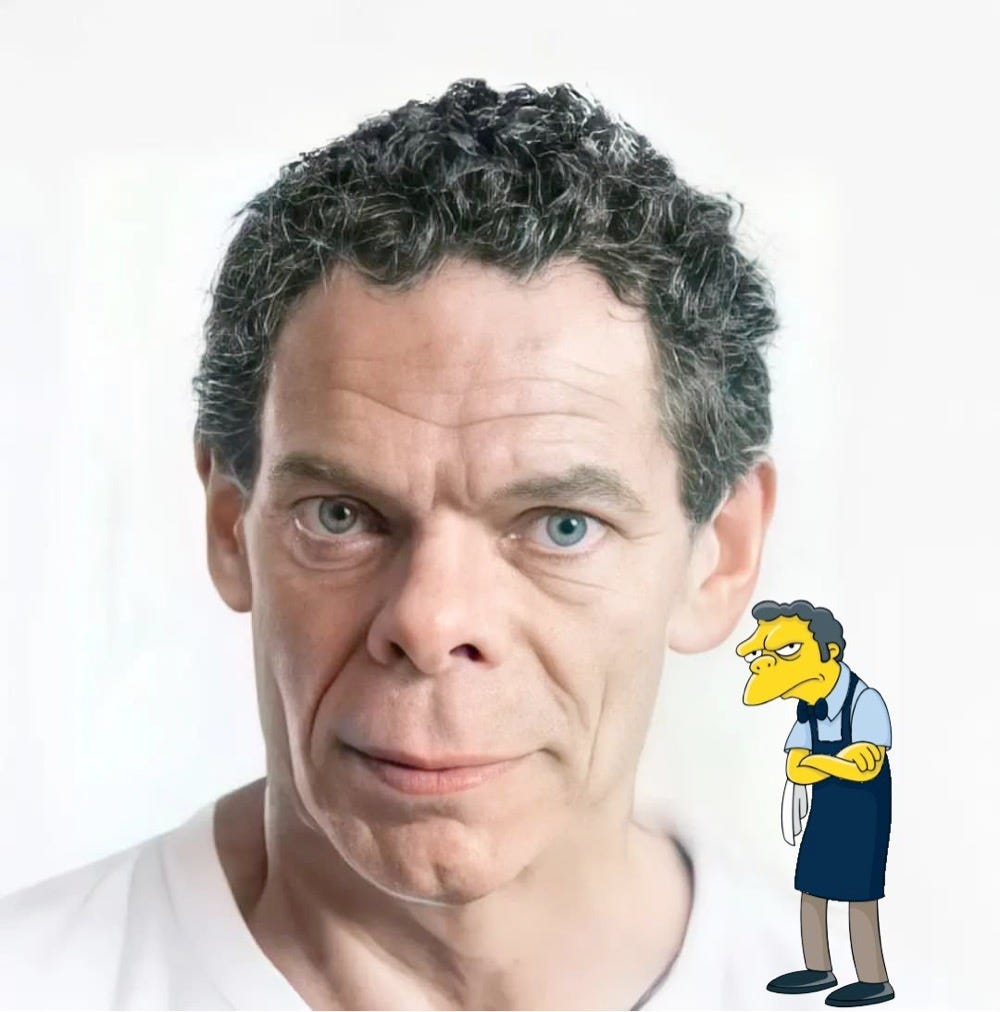The Curious About Everything Newsletter #15
The best things I read in February and March, about animals, Ukraine, the pandemic, and more.
Welcome back to Curious About Everything. I haven’t been feeling very well, so this month’s missive is out later than I wanted it to be! Hoping the links make it worth the wait.
First, some updates:
The Legal Lemur drive raised $750 and we adopted two lemurs from the Duke Lemur Center, a Coquerel’s Sifaka (the thumbnail for this newsletter!) and an Aye-Aye. I’m waiting on my adoption package to send out information about our two adorable animals.
Over on Patreon, I shared two longer posts: a resource for How to Cope With Overwhelm, including the despair many of us feel in the world right now, and What I Wish For as the Pandemic Drags On, a post about how high risk people are being left behind, and concrete solutions that would help mitigate spread (e.g. ventilating classrooms, a rolling system for masks based on community spread, etc).
It’s my last few months in Gatineau, Quebec before I move over to Ottawa. Long-term readers know that I’m heading across the river to be closer to my brother, who is there.
It’s been 7 months now that I’ve been able to live independently. I couldn’t do it without the help from my brother and his partner once a week, including help accessing groceries and batch-cooking food. Still, after 22 hours a day in bed for years, it is a marvel to even have clawed back this much independence. It was a cozy and lovely winter of early sunsets and snowfalls. A big change to my former life, but I nonetheless appreciate the quiet peace on a deep level, even though there is a lot I still grieve.
My CNN piece led to many reader messages, but also some discussions with doctors who treat spinal CSF leaks. I am honoured that my work has helped patients feel more seen, and opened up conversations about treatments and diagnosis of this complicated, difficult condition.
The Best Things I Read Lately
A mix of light and heavy, nature and space and animals, as well as reads about Ukraine, the Pandemic, and more.
🐘 Animals 🐘
Some animals, like orcas and elephants, have capacities greater than certain humans, like infants or those in vegetative states. Should the law protect them? Fascinating read about a legal case to redefine personhood, which is raising profound questions about the interdependence of the animal and human kingdoms.
A delightful story in about a robot that focuses on watching birds fly in front of the moon.
We already know that dogs can use their crazypants sense of smell to identify disease in human patients. So why aren’t there more dogs at the doctor’s office, to help in early diagnosis for patients?
Also, can we use ants? Apparently they can sniff out cancer.
Is there something special about how crows communicate? Indeed. “It’s mainly due to their high intelligence, but also because they live in social groups and have evolved to work together.” Given that the Legal Nomads mascot is Arthur the Crow, I had to include this one.
Monterey Bay Aquarium Research Institute released a 10-minute compilation of trippy deep sea creatures spotted during deep dives with cameras.
🌌 SPAAAAAACE 🌌
Take 30 seconds to watch Europe float by Jupiter in this animated composite of Cassini images by Kevin M. Gill.
Moon trees! Lovely read about a collection of tree seeds that went “round and round the moon” and were scattered far and wide in the United States upon their return. I had no idea moon trees existed. More about them from NASA, here.
The first images from the James Webb telescope were incredible, “better than our most optimistic prediction” said NASA. The telescope is 100x more sensitive than Hubble, and is “already capturing galaxies far more distant than any we have before.” And it’s just getting started.
🌱 Nature 🌱
I didn't expect to find a piece about seaweed collectors to be so delightful, but this beautifully-illustrated piece was a joy.
Feast your eyes on the 2021 World Nature Photography award winners, including the photo below by Sabrina Inderbitzi, on Lake Baikal in Siberia. Want more photo award winners? Head over to the Sony World Photography award Winners Gallery, which isn’t only nature shots but also portraits and more.
Beth Moon has been photographing ancient trees for a decade. “In the presence of old trees, I am reminded there is still grace and beauty in the world. These thoughts lead me past grief into hopefulness. By honoring the trees that remain, we celebrate the joy and splendor of our natural world.” Incredible, awe-inspiring images of these fragile, imposing beauties.
I did not realize that Harriet Tubman was also a naturalist! In this Smithsonian Mag piece, I learned that her understanding of botany, wildlife biology, geography and astronomy allowed her to guide herself and others to safety using the Underground Railroad.
🇺🇦 Ukraine 🇺🇦
Background reading from 2014, by Mark MacKinnon, a Canadian journalist who has spent a long time in the region, “How the West Lost Putin”.
Art from a Nation Under Attack. Ukrainian illustrators and artists bear witness to the fear, heroism and solidarity of their countrymen. I would add the talented Daria Hlazatova to that list. She has been updating daily via Instagram Stories, and her art is beautiful.
The Weakness of the Despot discusses Putin and the vulnerabilities inherent to despotism, as well as Russia’s historical trend toward autocrats, repression, and militarism—as well as its suspicion for the West.
Also from the New Yorker, The War That Russians Do Not See, on the propaganda fed to Russians in Russia. Such as: that Ukraine is being ‘liberated’, or that they are being ‘denazified’ — a lie that is a slap in the face to the Jewish PM of Ukraine, Zelenskyy, who lost members of his family to actual Nazis in WWII.
Related: how the American far-right became obsessed with “Ukrainian biolabs” conspiracies, falling prey to Russian propaganda. Further, social media feeds and channels dedicated to truck convoys have now become sources of war misinformation. More about this: (1) #Propaganda: Russia State-Controlled Media Flood TikTok With Ukraine Disinformation, (2) How Wellness Influencers Became Cheerleaders for Putin’s War, (3) ‘Freedom convoy’ forums find new focus: disinformation about Russia-Ukraine war, (4) Anti-vax conspiracy theorists in US turning to antisemitic pro-Putin propaganda, report says.
An interview with Alexander Gabuev, former editor at Kommersant, a Russian newspaper, about how Covid made Putin even more isolated and obsessed with Ukraine, and led him to plan his invasion in secret. (via The Browser)
🎉 Fun 🎉
Amazing, photorealistic pictures of popular cartoon characters made by Hidreley Diao using AI imaging software. The full gallery of the images are on his Instagram, here.
World’s first vegan violin made using berries and pears, in the UK.
Clive Thompson loves old books, so he developed a Weird Old Book Finder, where you can type in a subject and it finds you one book that matches it from the 18th/19th centuries.
The 60 most beautiful words in the English language, and how to use them. (Petrichor is one of my faves, and always has been! Glad to see it on the list.)
How a young illustrator’s attention to detail—and a determined Victorian woman’s legacy—led to the discovery of a new species in an old painting, 146 years later.
🦠 The Pandemic 🦠
I want the pandemic to be over as much as anyone else. But the virus doesn’t care. Absent in mentions about “learning to live with it” is a discussion about people like me, whose lives are already very limited. When community spread is high, we can’t even safely get care in an emergency if basic precautions are removed.
Though people tell me “wear a mask and stay home” when I mention the high risk population, one-way masking isn’t going to protect me when community spread is high. On the topic: Dr. Jeremy Faust: “When will one-way masking be safe enough for everyone?”
Should you get a 4th dose if you’re eligible? Your Local Epidemiologist answers the question, and also addresses whether a 4th dose is recommended if someone got Omicron: “If you had the first booster and a confirmed Omicron infection (i.e. positive antigen test or PCR test), there’s really very little need to get a fourth dose […] This doesn’t mean you should purposefully get COVID19, but we need to recognize this as a viable path to protection.”
Moving, very well-written piece from a woman who got sober during lockdown.
The truth is that most of my drinking and using had one primary purpose: to allow me to feel less. To be less aware. To not have to live in my own brain or settle for the reality of living in the world as myself. To hide from how overwhelmed I was by seemingly everything.
So it’s a little unbelievable that a year in which I was forced to feel things all the time, to be aware of all of it, and to, the whole time, be stuck being me—what seemed like a truly disgusting option—was, in the rearview, better than any of the years in which I’d been able to hide. “I got sober during the pandemic. It saved my life.”
Covid is airborne, so ventilation is an important factor for risk mitigation. There is a cost to ventilating a place more effectively, but it would also benefit students, office workers and everyone else during cold and flu season, not just Covid. A recent study in Italy showed that proper ventilation in a classroom reduced Covid cases by 82%. Ventilation provides another avenue to try and keep people safe, yet few governments have invested in it.
To that end, engineer Joey Fox, who specialises in HVAC and filtration systems, put a thread together about how to mitigate secondary attack rates in the home to prevent others from catching Covid when a household member comes down with it:

On Long Covid. From The Guardian: “Part of the agony of long Covid is that you really are not the person you were before.” From REI Magazine: “Within my online long Covid support group are former ultramarathon runners who can no longer make the distance to their own mailboxes since contracting COVID-19. Microclots have been found in the blood of many Long Covid patients, as well as evidence of serious cognitive issues. Disability advocates have been warning us that mass infection of Covid would lead to a mass disabling event. Current figures show they were correct, and we will not get better unless our illness is taken seriously with fast-track research and clinical trials.” From the New York Times, How Long Covid Exhausts the Body (non-paywall access here): “It’s really not something you can push through.”
The app Pocket curated a list of reads about disability and Covid.
Ed Yong has consistently managed to write pieces that thoroughly braid in many different viewpoints. In an earlier piece in March, he noted that “to grapple with the aftermath of a disaster, there must first be an aftermath”. Covid is not yet endemic, but we’re acting like it is. (Same applies to Canada right now.)
Speaking of: at the time of writing 4,445,557 people are currently predicted to have symptomatic COVID in the UK.
Important: the meds that interact with the Paxlovid pill. Have a read before you take it!
Ending on a horrifying note: a rightfully scathing review of Sweden’s despicable treatment of the elderly and at risk during the pandemic’s early days. “Many elderly people were administered morphine instead of oxygen despite available supplies, effectively ending their lives.” Unreal.
That’s it for February and March reads.
Sending love from the Gatineau,
Jodi






